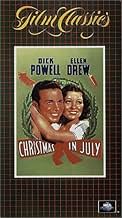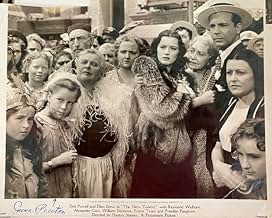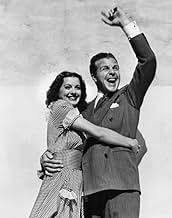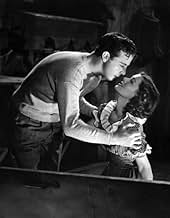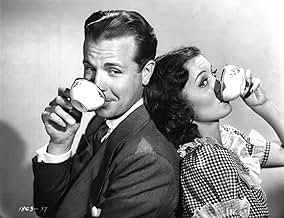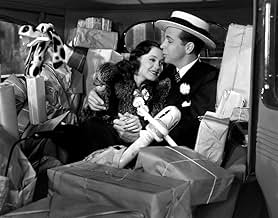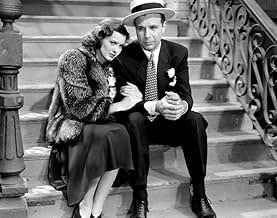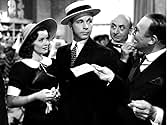IMDb-BEWERTUNG
7,3/10
4570
IHRE BEWERTUNG
Füge eine Handlung in deiner Sprache hinzuAfter the co-workers of an ambitious clerk trick him into thinking he has won $25,000 in a slogan contest, he begins to use the money to fulfill his dreams. What will happen when the ruse is... Alles lesenAfter the co-workers of an ambitious clerk trick him into thinking he has won $25,000 in a slogan contest, he begins to use the money to fulfill his dreams. What will happen when the ruse is discovered?After the co-workers of an ambitious clerk trick him into thinking he has won $25,000 in a slogan contest, he begins to use the money to fulfill his dreams. What will happen when the ruse is discovered?
- Auszeichnungen
- 3 wins total
Adrian Morris
- Tom
- (as Michael Morris)
Al Bridge
- Mr. Hillbeiner
- (as Alan Bridge)
Victor Potel
- Davenola Salesman
- (as Vic Potel)
George Anderson
- Mr. Jenkins
- (Nicht genannt)
Empfohlene Bewertungen
This may be my favorite Preston Sturges film. It's as well written and well crafted as anything he made after it. Sturges had a knack for creating unique characters and throwing them into even more unique situations.
Jimmy MacDonald is absolutely determined to make money the easy way; by winning a contest. A few of his coworkers, aware of his desperation to win an upcoming contest, decide to send him a telegram in order to make him believe he's won the recent contest, along with the enormous cash reward. What begins as a cruel little joke (to find out how Jimmy would react to winning) becomes something much bigger. It wouldn't make sense for me to explain the plot any further; much of the enjoyment in watching the film comes from how it unpredictably unfolds.
"Christmas in July" is rather unusual in comparison to some of Sturges other movies, namely his two most famous films, "The Lady Eve" and "The Palm Beach Story". It contains more pathos and less sexual innuendos, but it never becomes cheap, manipulative melodrama. It's also quite short in comparison to his other movies, but it's all the better for it.
Jimmy MacDonald is absolutely determined to make money the easy way; by winning a contest. A few of his coworkers, aware of his desperation to win an upcoming contest, decide to send him a telegram in order to make him believe he's won the recent contest, along with the enormous cash reward. What begins as a cruel little joke (to find out how Jimmy would react to winning) becomes something much bigger. It wouldn't make sense for me to explain the plot any further; much of the enjoyment in watching the film comes from how it unpredictably unfolds.
"Christmas in July" is rather unusual in comparison to some of Sturges other movies, namely his two most famous films, "The Lady Eve" and "The Palm Beach Story". It contains more pathos and less sexual innuendos, but it never becomes cheap, manipulative melodrama. It's also quite short in comparison to his other movies, but it's all the better for it.
Joyous dose of whimsy from writer-director Preston Sturges, a filmmaker who always managed to wring both sentiment and cynicism from a fairy tale premise. Dick Powell plays a working-class guy under the impression he's just won $25K in a coffee-slogan contest. Based on a play Sturges wrote in 1931 (titled "A Cup of Coffee"), the film is brief at 70mns but sharp as a tack, and a wonderful stroll through Hollywood's Golden Era. Powell is terrific, and Ellen Drew is equally good as his sweetheart. A gem from Paramount, one which received not a single nomination from any awards branch. ***1/2 from ****
Have said many times about being a pre-1970s classic film fan, of all genres and decades, a lot of my favourite films being made between the 1930s and 1960s. The same applies too for films from the 1970s onwards. Am not saying that every pre-1970s film is great, there are a fair share of average all the way down to dud ones but they are out-weighed by the very good to classic films (the best parodied and referenced numerous times since and influenced many film-makers).
Preston Sturges had for me one of the best "golden years"/prime period for any director, which started with his debut film 'The Great McGinty' (which is very good). My definition of this is when a director makes 5 or more great films in a row. From this period, even when the film was one of the weaker ones it still managed to be good and more, which is testament to how great and more his best golden years/"prime period" films were. Feel the same about 'Christmas in July' as with 'The Great McGinty', though slightly preferring the former. Found 'Christmas in July' to be a joy to watch and deserving of more praise than it gets, when it comes to satirising dreamers placing faith in get-rich contests 'Christmas in July' is a great and relatively overlooked example of how to do it well, make it entertaining while also relatable and tactful.
Can find hardly anything to fault actually. Maybe it is a little too short, would have been more than happy with having 10-15 minutes more perhaps. That can be easily ignorable though, as there is not a dull second to be had in 'Christmas in July', one of those films that drew me in from the start and never let go, and the many good things are so great.
Maybe other Sturges films are sharper (am actually going to include 'The Great McGinty' here), have more insights into the subjects explored and are more daring. Again a very subjective personal preference and not actually much of a knock on the film.
That it's so beautifully paced throughout and always compelling in its story, which entertained and invested emotionally, is one strength of 'Christmas in July', but there are many more. Sturges' direction continues to be remarkably well accomplished for again so early on (this is only his second film released quite close to 'The Great McGinty'). The production values are very good, very nicely shot in particular even if visually there aren't exactly iconic moments (not that it needed to be, not that kind of film).
A major strength of 'Christmas in July' is the script. The comedy is hilarious at its best and never gets corny. The pathos is genuinely touching without getting schmaltzy. And the romantic element is truly charming and with remarkable humanity. It's not always easy balancing more than two tones well and there have been many instances in films that do where one or more have not been handled well. 'Christmas in July' balances the comedy, pathos and romance deftly, no signs of them clashing with each other that it doesn't make sense, and all three as indicated are written spot-on. Then there are the performances, which are uniformly good. As likeable and charming Dick Powell and Ellen Drew are, and their chemistry is just lovely, it's the comedic performers who shine more with the main scene stealer being Raymond Walburn.
In summary, a joy. 9/10 Bethany Cox
Preston Sturges had for me one of the best "golden years"/prime period for any director, which started with his debut film 'The Great McGinty' (which is very good). My definition of this is when a director makes 5 or more great films in a row. From this period, even when the film was one of the weaker ones it still managed to be good and more, which is testament to how great and more his best golden years/"prime period" films were. Feel the same about 'Christmas in July' as with 'The Great McGinty', though slightly preferring the former. Found 'Christmas in July' to be a joy to watch and deserving of more praise than it gets, when it comes to satirising dreamers placing faith in get-rich contests 'Christmas in July' is a great and relatively overlooked example of how to do it well, make it entertaining while also relatable and tactful.
Can find hardly anything to fault actually. Maybe it is a little too short, would have been more than happy with having 10-15 minutes more perhaps. That can be easily ignorable though, as there is not a dull second to be had in 'Christmas in July', one of those films that drew me in from the start and never let go, and the many good things are so great.
Maybe other Sturges films are sharper (am actually going to include 'The Great McGinty' here), have more insights into the subjects explored and are more daring. Again a very subjective personal preference and not actually much of a knock on the film.
That it's so beautifully paced throughout and always compelling in its story, which entertained and invested emotionally, is one strength of 'Christmas in July', but there are many more. Sturges' direction continues to be remarkably well accomplished for again so early on (this is only his second film released quite close to 'The Great McGinty'). The production values are very good, very nicely shot in particular even if visually there aren't exactly iconic moments (not that it needed to be, not that kind of film).
A major strength of 'Christmas in July' is the script. The comedy is hilarious at its best and never gets corny. The pathos is genuinely touching without getting schmaltzy. And the romantic element is truly charming and with remarkable humanity. It's not always easy balancing more than two tones well and there have been many instances in films that do where one or more have not been handled well. 'Christmas in July' balances the comedy, pathos and romance deftly, no signs of them clashing with each other that it doesn't make sense, and all three as indicated are written spot-on. Then there are the performances, which are uniformly good. As likeable and charming Dick Powell and Ellen Drew are, and their chemistry is just lovely, it's the comedic performers who shine more with the main scene stealer being Raymond Walburn.
In summary, a joy. 9/10 Bethany Cox
Short and sweet, bright and breezy, but not without pith, this early Preston Sturges feature helped further establish his "wonder-kid" reputation in the early 40's before his great classics "Sullivan's Travels", "The Lady Eve" and my favourite "Hail The Conquering Hero".
The simple premise of a hoax win in a national coffee-slogan competition for ordinary average nice-guy Powell is the springboard for a light morality tale along the lines of "he who does good has good things happen to them" - although not without the usual series of ups and downs, just as you'd expect.
Of course nobody here is really bad, even the duped killjoy Mr, no make that Dr Maxford of the sponsoring coffee company or Mr Shindler of the too-trusting department store from whom Powell buys gifts for the whole neighbourhood on the strength of the phony winning telegram placed on his desk by his prankster work colleagues. Even when he finds out that his win is bogus, Powell can't get angry at the tricksters, so it's no real surprise that his homeliness, honesty and humility wins everyone over, including his feisty girl-friend, played by Ellen Drew, with the predictable twist in the last reel that Powell's slogan wins anyway.
Powell is very likeable in the lead, although Drew is a little too high-pitched in delivery for my taste as the film develops. There's the usual troop of madcap eccentrics which peoples almost every Sturges comedy, with some nice little cameos, I particularly liked the actor playing the deadpan cop, not above making some contemporary allusions to Hitler & Mussolini to stress a point.
The dialogue of course is mile-a-minute vernacular and I got a kick out of Sturges' Dickensian word-play over triple-barrelled lawyer's names (along the lines of "Swindle Cookum and Robbem!"). Right from the start, we get the "screwball comedy" template of a poor Joe and his girl, dreaming of something bigger waiting for something extraordinary to happen, with Powell and Drew's extended night-time scene on their New York apartment roof-top, and succeeding entertaining scenes including Powell's reaction to "winning" the competition and best of all the frenetic crowd scene when Maxford tries to get his money back only to cop a batch of rotten fruit ("Don't throw the good stuff" admonishes one parent to a tomato-wielding youngster), it's all good clean fun and ends up happily ever after. And get a load of that "zoom" shot back into Maxford's office at the end - it certainly got me out of my chair, not the last time Sturges employed camera tricks of this type - remember the memorable stop-start sequence to "The Palm Beach Story".
The movie celebrates community, the little guy who dreams of making it big and how to meet disaster with alacrity, in short a feel-good movie with a big heart, well worth an hour and four minutes of anyone's time.
The simple premise of a hoax win in a national coffee-slogan competition for ordinary average nice-guy Powell is the springboard for a light morality tale along the lines of "he who does good has good things happen to them" - although not without the usual series of ups and downs, just as you'd expect.
Of course nobody here is really bad, even the duped killjoy Mr, no make that Dr Maxford of the sponsoring coffee company or Mr Shindler of the too-trusting department store from whom Powell buys gifts for the whole neighbourhood on the strength of the phony winning telegram placed on his desk by his prankster work colleagues. Even when he finds out that his win is bogus, Powell can't get angry at the tricksters, so it's no real surprise that his homeliness, honesty and humility wins everyone over, including his feisty girl-friend, played by Ellen Drew, with the predictable twist in the last reel that Powell's slogan wins anyway.
Powell is very likeable in the lead, although Drew is a little too high-pitched in delivery for my taste as the film develops. There's the usual troop of madcap eccentrics which peoples almost every Sturges comedy, with some nice little cameos, I particularly liked the actor playing the deadpan cop, not above making some contemporary allusions to Hitler & Mussolini to stress a point.
The dialogue of course is mile-a-minute vernacular and I got a kick out of Sturges' Dickensian word-play over triple-barrelled lawyer's names (along the lines of "Swindle Cookum and Robbem!"). Right from the start, we get the "screwball comedy" template of a poor Joe and his girl, dreaming of something bigger waiting for something extraordinary to happen, with Powell and Drew's extended night-time scene on their New York apartment roof-top, and succeeding entertaining scenes including Powell's reaction to "winning" the competition and best of all the frenetic crowd scene when Maxford tries to get his money back only to cop a batch of rotten fruit ("Don't throw the good stuff" admonishes one parent to a tomato-wielding youngster), it's all good clean fun and ends up happily ever after. And get a load of that "zoom" shot back into Maxford's office at the end - it certainly got me out of my chair, not the last time Sturges employed camera tricks of this type - remember the memorable stop-start sequence to "The Palm Beach Story".
The movie celebrates community, the little guy who dreams of making it big and how to meet disaster with alacrity, in short a feel-good movie with a big heart, well worth an hour and four minutes of anyone's time.
"Christmas in July" (Paramount, 1940), the second feature entirely written, produced and directed by Preston Sturges, following his initial success of "The Great McGinty" (1940), ranks the director's most mellow comedies, compared to his future efforts as "Miracle on Morgan's Creek" 1944). In spite of his reputation for his wild and crazy plots, along with his familiar assortment of bizarre characters, "Christmas in July" could understandably be mistaken for a Frank Capra film, a theme not so much on how a good fortune changes the common man, but how much the common man unselfishly changes the lives for the good of others.
The plot is relatively simple: James MacDonald (Dick Powell) and his fiancé, Betty Casey (Ellen Drew), sit on the rooftop of their New York City apartment building listening to the radio where the name of the contest winner for the best slogan is to be announced. Wondering about the delay, Maxford (Raymond Walburn), president of Maxford House Coffee Company, heads over to the room where he finds the jury (consisting of Sturges stock players of Dewey Robinson, Arthur Hoyt, James Conlin and Robert Warwick), headed by its foreman, Bildocker (William Demarest), unable to decide upon the winner. With time running out, Maxford has the very nervous Donald Hartman (Franklin Pangborn) go on air to postpone the name of the winner until further notice. Because he had entered many contests in the past, Jimmy is confident that his slogan,"If you can't sleep, it isn't the coffee; it's the bunk." to be a sure winner. The following morning, Jimmy reports to his office clerical job to find a telegram on his desk naming him as winner of the Maxford contest. Overly excited, Jimmy stands on top of his desk where he makes his announcement to his fellow co-workers. Not only does Mr. Waterbury (Harry Hayden), his supervisor, grants him time off to collect his $25,000 prize, but he is immediately promoted to vice-president under Mr. Baxter (Ernest Truex) as a reward for his good fortune. After Jimmy collects the check from Maxford, who's unaware and confused why he hasn't been informed of the jury's decision, Jimmy takes Betty to Schidel's Department Storewhere where he buys her an engagement ring, and using the rest of the check to purchase gifts for everybody in his neighborhood. The Christmas in July celebration comes an abrupt end when Maxford, realizing his error after finding Bildocker still unable to come up with the decision, to arrive at the scene, accompanied by Mr. Schnidel (Alexander Carr) of the department store, to take back everything, including the check, and expose Jimmy as a fraud. A neighborhood riot ensues before Jimmy and Betty are confronted by three of their co-workers, Tom (Michael Morris), Dick (Rod Cameron) and Harry (Harry Rosenthal) who confess to what was originally intended as a practical joke. Now that reality has set in, what's Jimmy to do? Will he be working a lot of overtime hours to pay for his purchases? Will Maxford sponsor more contests? Will the judges get to come up with the winner before next Christmas?
A Christmas story that's not necessarily about Christmas nor the 4th of July for that matter, but how it is more blessed to give than to receive every day of the year, not just on Christmas. While "Christmas in July" is at best when poking fun of the current trend of radio contests, the story simmers down only when centering upon the poverty-stricken couple Jimmy and Betty, yet, in true Preston Sturges tradition, throws in surprises here and there to hold interest and keep his audience laughing and completely satisfied in how everything is resolved. As much as Sturges could have selected good-natured actors as Gary Cooper, James Stewart or Henry Fonda in the leads, Dick Powell, former crooner of Warner Brothers musicals from the 1930s, making his Paramount debut, turns out to be a fine choice, particularly at this point of renewing his screen image. Aside from the plot it development of its leading characters, Jimmy being an average guy, engaged to a nice girl, living with his widowed mother (Georgia Caine) in a tenement apartment whose ambition is to succeed, Sturges also does a remarkable job with his assortment of neighbors of different ethnic background gathered together in the neighborhood sequence to appear very much true to life. He adds a touch of sentimentality with a memorable bit as Jimmy awards Sophie (Sheila Sheldon), a wheelchair bound girl, with an expensive doll she can call her own. Surprised as well as speechless, she looks up to Jimmy before hugging the gift like a new born baby, which is enough thanks any giver can ever receive. And thanks to Sturges for such a fine motion picture leaving us with something to think about, "If you can't sleep, it isn't the coffee; it's the bunk."
This seldom revived comedy gem that says it in 67 minutes made it to video cassette in 1985 at a high price of $59.95, followed by several cable television presentations, such as the Disney Channel (1991- 1996) and Turner Classic Movies where it premiered in 2002. It's 2006 availability on DVD will assure renewed interest for both movie and the comedy films of Preston Sturges. (***1/2)
The plot is relatively simple: James MacDonald (Dick Powell) and his fiancé, Betty Casey (Ellen Drew), sit on the rooftop of their New York City apartment building listening to the radio where the name of the contest winner for the best slogan is to be announced. Wondering about the delay, Maxford (Raymond Walburn), president of Maxford House Coffee Company, heads over to the room where he finds the jury (consisting of Sturges stock players of Dewey Robinson, Arthur Hoyt, James Conlin and Robert Warwick), headed by its foreman, Bildocker (William Demarest), unable to decide upon the winner. With time running out, Maxford has the very nervous Donald Hartman (Franklin Pangborn) go on air to postpone the name of the winner until further notice. Because he had entered many contests in the past, Jimmy is confident that his slogan,"If you can't sleep, it isn't the coffee; it's the bunk." to be a sure winner. The following morning, Jimmy reports to his office clerical job to find a telegram on his desk naming him as winner of the Maxford contest. Overly excited, Jimmy stands on top of his desk where he makes his announcement to his fellow co-workers. Not only does Mr. Waterbury (Harry Hayden), his supervisor, grants him time off to collect his $25,000 prize, but he is immediately promoted to vice-president under Mr. Baxter (Ernest Truex) as a reward for his good fortune. After Jimmy collects the check from Maxford, who's unaware and confused why he hasn't been informed of the jury's decision, Jimmy takes Betty to Schidel's Department Storewhere where he buys her an engagement ring, and using the rest of the check to purchase gifts for everybody in his neighborhood. The Christmas in July celebration comes an abrupt end when Maxford, realizing his error after finding Bildocker still unable to come up with the decision, to arrive at the scene, accompanied by Mr. Schnidel (Alexander Carr) of the department store, to take back everything, including the check, and expose Jimmy as a fraud. A neighborhood riot ensues before Jimmy and Betty are confronted by three of their co-workers, Tom (Michael Morris), Dick (Rod Cameron) and Harry (Harry Rosenthal) who confess to what was originally intended as a practical joke. Now that reality has set in, what's Jimmy to do? Will he be working a lot of overtime hours to pay for his purchases? Will Maxford sponsor more contests? Will the judges get to come up with the winner before next Christmas?
A Christmas story that's not necessarily about Christmas nor the 4th of July for that matter, but how it is more blessed to give than to receive every day of the year, not just on Christmas. While "Christmas in July" is at best when poking fun of the current trend of radio contests, the story simmers down only when centering upon the poverty-stricken couple Jimmy and Betty, yet, in true Preston Sturges tradition, throws in surprises here and there to hold interest and keep his audience laughing and completely satisfied in how everything is resolved. As much as Sturges could have selected good-natured actors as Gary Cooper, James Stewart or Henry Fonda in the leads, Dick Powell, former crooner of Warner Brothers musicals from the 1930s, making his Paramount debut, turns out to be a fine choice, particularly at this point of renewing his screen image. Aside from the plot it development of its leading characters, Jimmy being an average guy, engaged to a nice girl, living with his widowed mother (Georgia Caine) in a tenement apartment whose ambition is to succeed, Sturges also does a remarkable job with his assortment of neighbors of different ethnic background gathered together in the neighborhood sequence to appear very much true to life. He adds a touch of sentimentality with a memorable bit as Jimmy awards Sophie (Sheila Sheldon), a wheelchair bound girl, with an expensive doll she can call her own. Surprised as well as speechless, she looks up to Jimmy before hugging the gift like a new born baby, which is enough thanks any giver can ever receive. And thanks to Sturges for such a fine motion picture leaving us with something to think about, "If you can't sleep, it isn't the coffee; it's the bunk."
This seldom revived comedy gem that says it in 67 minutes made it to video cassette in 1985 at a high price of $59.95, followed by several cable television presentations, such as the Disney Channel (1991- 1996) and Turner Classic Movies where it premiered in 2002. It's 2006 availability on DVD will assure renewed interest for both movie and the comedy films of Preston Sturges. (***1/2)
Wusstest du schon
- WissenswertesSturges helped invent the gadget sofa demonstrated in the department store scene.
- Zitate
Jimmy MacDonald: If you can't sleep, it isn't the coffee. It's the bunk.
- Alternative VersionenThere is an Italian edition of this film, as Bonus Extra, on DVD "ORE X: COLPO SENSAZIONALE", re-edited with the contribution of film historian Riccardo Cusin. This version is also available for streaming on some platforms.
- VerbindungenFeatured in Telefon Terror (1988)
- SoundtracksWhen We're Alone (Penthouse Serenade)
(1931)
Words & Music by Will Jason and Val Burton
Used as background music behind Dick Powell and Ellen Drew in rooftop scene, and later throughout the film.
Top-Auswahl
Melde dich zum Bewerten an und greife auf die Watchlist für personalisierte Empfehlungen zu.
- How long is Christmas in July?Powered by Alexa
Details
Box Office
- Weltweiter Bruttoertrag
- 471 $
- Laufzeit1 Stunde 7 Minuten
- Farbe
- Seitenverhältnis
- 1.37 : 1
Zu dieser Seite beitragen
Bearbeitung vorschlagen oder fehlenden Inhalt hinzufügen



